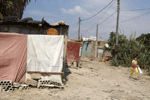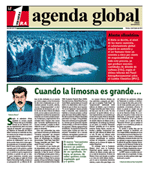Published on Mon, 2013-10-14 23:00
On October 17 2013, the International Movement ATD Fourth World will host the commemoration of the International Day for the Eradication of Poverty at United Nations Headquarters. The first celebration was in 1992, when the United Nations declared October 17th the International Day for the Eradication of Poverty. For the last two decades, this day has promoted understanding between people living in poverty and the society at large. The theme for this year will be “Working together towards a world without discrimination: Building on the knowledge of people living in extreme poverty.” One of the most painful aspects of a life in poverty is the discrimination faced by people on a daily basis; their marginalization in the political, economic, and social spheres of their societies, and their lack of voice and representation in the conceptualisation, implementation and evaluation of policies and programmes that affect them directly and indirectly. |
Published on Thu, 2013-10-10 14:29
One cannot discuss policy priorities and challenges in Lebanon without first addressing the dangerous developments the region is currently experiencing. Oppression, backwardness and the shortcomings of democracy in the region as a whole are serious hindrances that could turn the tide and reverse the more positive trends. Despite the challenges they raise, the current developments clearly demonstrate the potential for change in the region: people are no longer willing to stand idle in the face of tyranny, poverty, unemployment and marginalization. Lebanon is still facing the systemic challenges of the political confessional system. The state must be an institutional and constitutional expression of democracy and people’s rights. Genuine citizenship cannot be achieved without the rule of law, without a system that gives citizens their rights and duties towards both society and the state, which are also preconditions for an effective civil society. Thus the main obstacle to true citizenship in the country is still the partition of state offices and institutions among the different religious confessions. |
Published on Wed, 2013-10-09 23:00
While the debate around increasing corporate influence at the United Nations is growing, Secretary-General Ban Ki-moon sticks with his plan to establish a new United Nations Partnership Facility within the UN Secretariat. The new facility is intended to "scale up UN capacity to engage in transformative multi-stakeholder partnerships with the private sector, civil society, philanthropists and academia across a broader range of issue areas". But as financing for the new institution will come from donors rather than from regular UN budget, questions to its accountability and oversight arise. Roberto Bissio, director of the Third World Institute in Montevideo, raises such questions in context of the current discussions of a post-2015 development agenda. |
Published on Wed, 2013-10-09 16:09
The application of Guiding Principles on Business and Human Rights (GPs) in the financial sector came under focus at hearings held in the United States (Washington DC and New York). The hearings were part of activities by the Working Group on Business and Human Rights, a United Nations body established in 2011 to promote dissemination and implementation of the Guiding Principles. One of the ways in which the Working Group does this is by carrying out visits to particular countries to look at implementation by companies therein. |
Published on Mon, 2013-10-07 23:00
The tragic loss of some 300 refugees off Lampedusa on October 3 gives public focus to the harsh and cruel reality facing thousands fleeing insecurity and oppression in the countries of their birth. A boat which traveled from Libya caught fire in close reach of the Italian coast. There were some 500 Eritreans on board, but only 147 were rescued according to media reports. The large loss of life taking place in sight of the Italian beaches has shocked Italy, Europe and the world. It emphasizes the failure of Europe and Africa to protect the rights of refugees who embark on their perilous voyages believing that they have little choice. According to the UN, 30,100 migrants reached Italy by sea so far this year and some 7,500 Eritreans have been registered amongst them. October 5 is being observed as a day of mourning and Pope Frances has called for ‘a day of tears’. |
SUSCRIBE TO OUR NEWSLETTER







